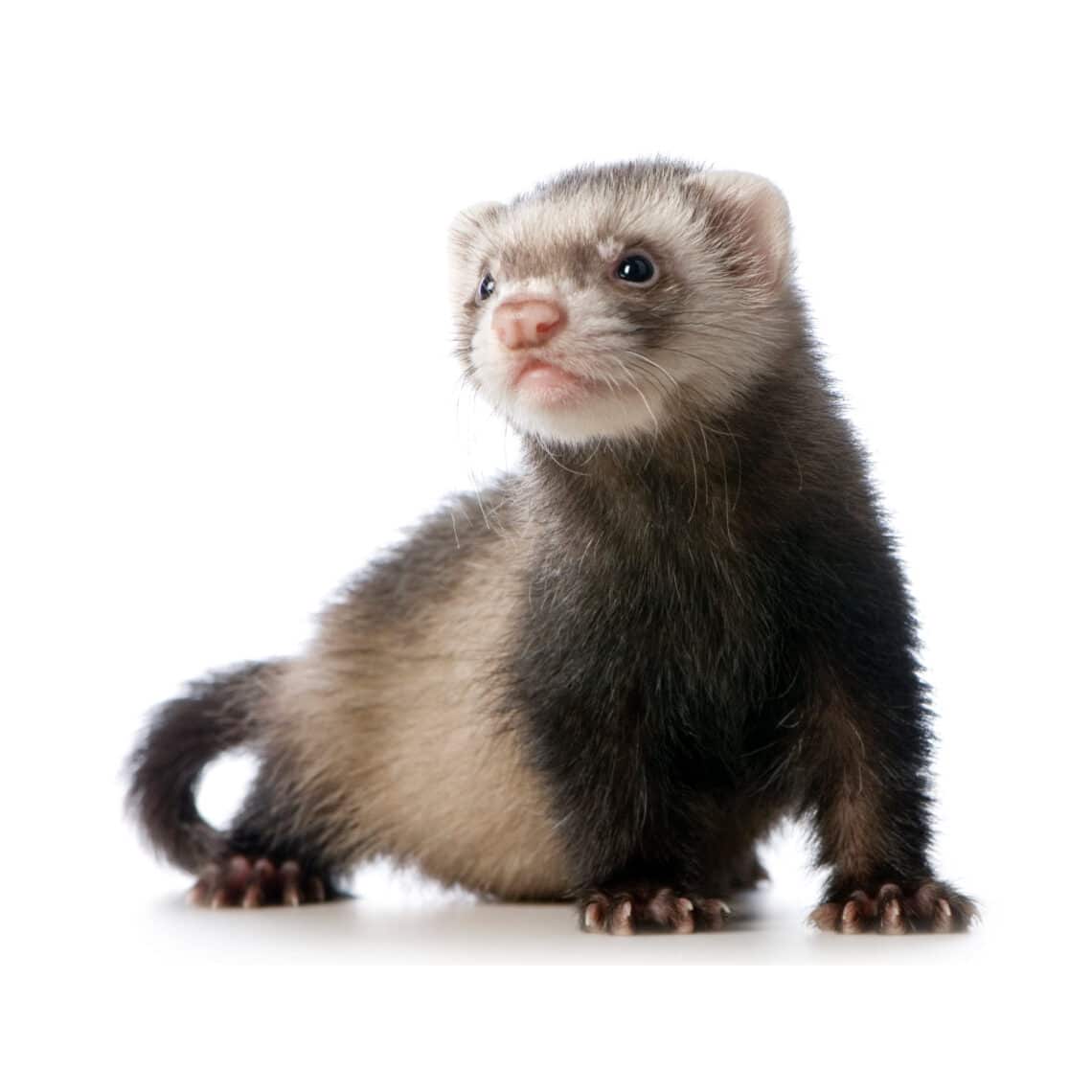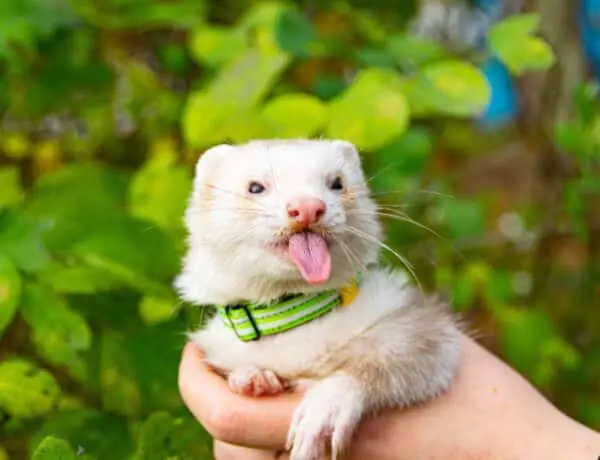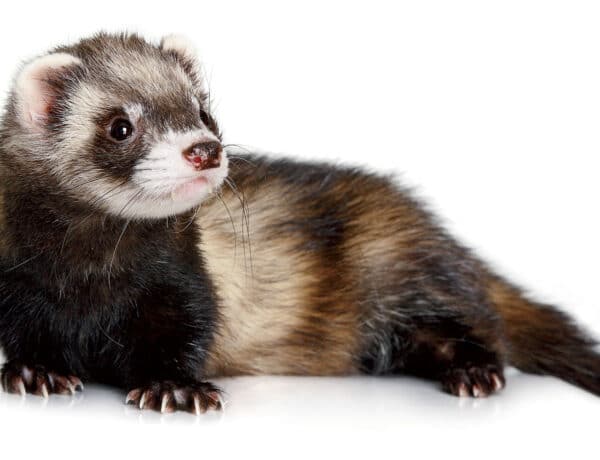Introduction
How Much Do Ferrets Weigh: When it comes to our furry and inquisitive friends, ferrets, there is often curiosity surrounding various aspects of their care and physiology. Understanding the typical weight range of ferrets is not only essential for gauging their overall health but also for ensuring proper nutrition and care. In this exploration, we will delve into the fascinating world of ferret weights, examining the factors that influence their size and offering insights into what you can expect when sharing your life with these charming and mischievous companions. Whether you’re a seasoned ferrets dark owner or simply considering bringing one into your home, the weight of these playful creatures is a vital aspect of their well-being that deserves our attention. Ferrets, with their sleek bodies and boundless energy, have carved a unique niche in the world of domesticated pets.
As inquisitive and agile creatures, they captivate their human companions with their playful antics and endearing personalities. However, to ensure the health and happiness of these delightful creatures, it’s crucial to understand their physical characteristics, and weight is a fundamental aspect of this knowledge. In this exploration of how much ferrets weigh, we’ll not only delve into the numbers but also uncover the intriguing factors that contribute to their weight variations. From their genetic makeup and age to diet and exercise, numerous elements influence a ferret’s size and weight. By gaining a deeper understanding of these factors, you’ll be better equipped to provide the optimal care and environment for your furry friends.
So, let’s embark on this journey to demystify the weight of ferrets and uncover the secrets behind these lovable companions’ diverse sizes and shapes. Beyond the sheer curiosity of knowing how much ferrets weigh, their weight is a critical indicator of their overall health and well-being. Just like any other pet, ferrets require attentive care, and their weight can serve as a vital diagnostic tool for identifying potential health issues. Whether you’re a dedicated ferret owner or someone considering adopting these charismatic creatures, understanding the intricacies of their weight can help you ensure their longevity and quality of life.

What is a healthy weight for a ferret?
Ideal Ferret Weight and Length
Females weigh between one and three pounds if neutered. Including the tail, females usually measure around 18 inches long. Neutered male ferrets weigh between two and four pounds. Unaltered males may weigh up to six pounds!
Age: The age of a ferret can significantly influence its healthy weight range. Kits (baby ferrets) will naturally weigh less than adult ferrets. As they grow and develop, their weight will increase, with most ferrets reaching their full adult size and weight by around 9-12 months of age.
Gender: Male and female ferrets may have different weight ranges. Generally, male ferrets (hobs) tend to be larger and heavier than female ferrets (jills). However, it’s crucial to remember that individual variations exist within each gender.
Genetics: Ferrets come in various genetic backgrounds, which can affect their size and weight. Some ferrets may naturally be larger or smaller than average based on their genetic makeup.
Diet: Diet plays a critical role in a ferret’s weight. Feeding a high-quality ferret-specific diet is essential to maintain their health. Overfeeding can lead to obesity, while underfeeding can result in undernourishment and weight loss. Ensure you’re following appropriate feeding guidelines for your ferret’s age and activity level.
Are ferrets cute pets?
They Are Super Cute
Their long slender body and adorable fluffy faces make them wonderful companions. They are also a good conversation starter. You can even dress up your ferret like you would with a cat or dog. You can take pictures of your ferret to post on all your social media accounts.
Playful Nature: Ferrets are known for their boundless energy and playful antics. They exhibit a kitten-like exuberance throughout their lives, engaging in entertaining games of chase, hide-and-seek, and tunnel exploration. Watching them frolic and bound around can bring endless joy and smiles.
Expressive Faces: Ferrets have expressive faces that convey a range of emotions, from curiosity to excitement. Their whiskers, twitching noses, and bright, inquisitive eyes make it hard to resist their charms. You can’t help but be drawn in by their adorable expressions.
Cuddly and Affectionate: While ferrets are active and playful, they also enjoy cuddling and snuggling with their human companions. Their warmth and affectionate nature create a strong bond between ferrets and their owners, making them even more endearing.
Unique Personalities: Just like people, each ferret has its own distinct personality. Some are outgoing and adventurous, while others may be more reserved and introspective. These individual quirks and traits add depth to their cuteness, making them incredibly captivating.
Tiny Features: Ferrets are small animals with petite paws, velvety ears, and sleek, glossy fur. Their diminutive size accentuates their cuteness, and their dainty features are a constant source of adoration.
Are ferrets stronger than cats?
A ferret would likely put up a spirited defense, but as ambush predators, the cat would have an advantage from the onset. They are also larger, have depressible sickle claws, and superior eyesight.
Agility: Ferrets are incredibly agile and flexible animals. They are known for their ability to twist and turn through tight spaces, climb, and even leap considerable heights for their size. This agility allows them to navigate complex environments and escape from potential threats.
Digging and Burrowing: Ferrets are natural burrowers. They have strong front claws designed for digging, allowing them to create tunnels and burrows. This digging ability is both a survival instinct and a way to escape predators.
Predatory Instincts: Ferrets have a strong predatory instinct, and they are skilled hunters. While they may not be as large or powerful as some cat breeds, they make up for it with their tenacity and teamwork when hunting small prey like rodents.
Strength and Power: Cats are known for their strength and power. They have powerful muscles, sharp claws, and strong jaws. Larger cat breeds, such as tigers and lions, are among the most formidable predators in the animal kingdom.
Are ferrets child friendly?
Ferret owners should be aware that although ferrets can make good pets, they can sometimes carry germs that can make people sick. Ferrets are also not recommended for homes with children under 5 years of age because of the increased risk of injury from bites.
The temperament of a ferret can vary from one individual to another. Some ferrets are naturally more tolerant and patient, making them better suited for interaction with children. Others may be more skittish or less tolerant of handling.
Young children may not fully understand how to handle pets gently and may unintentionally hurt or stress a ferret. It’s essential to teach children how to approach and interact with ferrets, emphasizing gentle handling and respect for the animal’s boundaries.
Close supervision is critical when a ferret is interacting with children. Ferrets have sharp teeth and claws and can react defensively if they feel threatened or mishandled. Ensuring that an adult is present to oversee interactions can prevent accidents and ensure the safety of both the child and the ferret.
Properly socialized ferrets are more likely to be comfortable around children. Ferrets that have positive experiences with people of all ages from a young age tend to be more tolerant and adaptable to various interactions.
How old is a 7 year old ferret in human years?
Veterinarians consider a ferret to be middle-aged at three years and senior at five or more years of age. To gain perspective on their life span, each year of a ferret’s life is approximately equal to 10–14 years of a human’s life.
Determining the age of a ferret in human years is a common question among ferret owners, as it helps put their pet’s lifespan into perspective. However, the conversion of ferret years to human years isn’t as straightforward as a simple multiplication. Ferrets age differently from humans due to variations in their life stages and lifespans.
Ferrets typically have a shorter lifespan than humans. The average lifespan of a ferret is around 6 to 10 years, although some can live longer with excellent care.
Therefore, a 7-year-old ferret is roughly equivalent to a human between 35 and 49 years old. Keep in mind that this is a general approximation, and individual ferrets may age slightly differently based on their health, genetics, and care.
It’s important to note that ferrets go through various life stages, just like humans do. As they age, their needs and health requirements may change, so it’s essential to provide appropriate care and regular veterinary check-ups to ensure their well-being as they progress through their life stages.
How strong are ferret teeth?
A ferret’s teeth are sharp enough to tear its mammal prey apart, which also deliver unpleasant bites. Its fangs or canines can pierce through the flesh of any prey or adversary. However, their teeth may be sharp enough to cut meat but are not strong enough to bite through bones.
Chewing and Exploration: Ferrets are known for their curiosity, and they often explore their environment by nibbling and chewing on various objects. This behavior is not just about play; it helps keep their teeth healthy by wearing them down. However, it can also lead to inappropriate chewing if ferrets are not provided with suitable toys and stimulation.
Health Considerations: Just like with any animal, maintaining the health of a ferret’s teeth is essential. Dental problems can arise if their teeth become misaligned, overgrown, or if they develop issues such as cavities or abscesses. Regular veterinary check-ups can help identify and address dental issues.
Biting Behavior: While ferrets rarely bite without reason, they may bite if they feel threatened, frightened, or in pain. Proper socialization, training, and understanding of ferret body language can help minimize the risk of bites.
Sharpness: Ferret teeth are sharp and pointed, designed for gripping, tearing, and slicing through food. They have both incisors (front teeth) and carnassial teeth (cheek teeth) that are well-suited for their carnivorous diet.
Do ferrets ever cuddle?
Many ferrets like to snuggle with their humans. One thing you can try is getting a hoodie with a front pocket. Your furry little pal may like to curl up in there as you’re relaxing. You can also lie down on the floor with a blanket.
Individual Variation: Just like people, ferrets have unique personalities. Some ferrets are naturally more inclined to cuddle, while others may be more independent and less interested in extended periods of physical affection. It’s essential to recognize and respect your ferret’s individual preferences.
Bonding: Cuddling can be a way for ferrets to bond with their owners. Ferrets are social animals and form strong attachments to their human caregivers. Cuddling can strengthen the bond between you and your ferret.
Warmth-Seeking: Ferrets are sensitive to temperature changes, and they may seek warmth by cuddling with you or nestling into blankets or clothing. They enjoy the cozy feeling of being close to a warm body.
Sleeping Habits: Ferrets are known for their love of sleep, often spending a significant portion of their day napping. They may choose to sleep next to or on top of you, providing a cuddly and comforting presence during their rest.
Playfulness: Ferrets’ playfulness can extend to cuddling sessions. Some ferrets may engage in playful nibbling or grooming during cuddle time, which is a sign of their affection and comfort with you.
Do ferret bites hurt?
It’s worth noting that the ferret’s skin is thicker and tougher than human skin, so when ferrets nip at each other in play, they don’t inflict any real pain. But when they nip at a human, it can hurt.
Playful Biting: Ferrets often engage in play with their teeth, which can involve gentle nibbling or mouthing. This behavior is typically not intended to harm but rather to explore their environment and interact with their owners. While these nibbles may not cause severe pain, they can be uncomfortable, especially if the ferret nips too hard.
Defensive Biting: Ferrets may bite defensively if they feel threatened, cornered, or scared. In such situations, their bites can be more painful and may break the skin. It’s essential to be cautious and respectful of a ferret’s body language to avoid triggering defensive bites.
Teething: Young ferrets, especially kits (baby ferrets), may go through a teething phase. During this period, they may chew more frequently and may nip as they explore their surroundings. Their bites can be sharp due to their developing teeth.
Health-Related Biting: If a ferret is in pain or discomfort due to an injury, illness, or dental issues, they may bite when touched in a sensitive area. It’s crucial to consult with a veterinarian if you suspect your ferret’s biting behavior is related to health concerns.

Conclusion
These playful and inquisitive creatures rely on us to provide them with the best care possible, and their weight serves as a crucial indicator of their overall health and well-being. Throughout our exploration, we’ve uncovered the factors that influence ferret weight, from genetics and age to diet and exercise. We’ve learned that monitoring and maintaining a healthy weight for our ferrets is essential at every stage of their lives, from playful kits to mature adults. We’ve also addressed common questions and concerns related to ferret nutrition and genetics, all of which contribute to their size and weight.
By gaining a deeper understanding of these factors, we can ensure that our ferrets live happy, healthy, and fulfilling lives. Whether you’re an experienced ferret enthusiast or a newcomer to the world of ferret ownership, the knowledge about their weight is a valuable tool for providing the best care possible to these charming and mischievous companions. So, as you embark on your journey with ferrets, remember that their weight is not just a number; it’s a vital sign of their vitality and well-being.
In the ever-evolving world of ferret care, staying informed about their weight and its significance is an ongoing commitment. As we’ve explored, a ferret’s weight can be a window into their health, and it’s a metric that requires vigilant attention to ensure they thrive. Regularly monitoring their weight, adjusting their diet, and providing ample opportunities for exercise are all essential aspects of responsible ferret ownership. Just as with people, ferrets come in various shapes and sizes, and what’s most important is not necessarily the number on the scale but rather their overall health and happiness.





No Comments